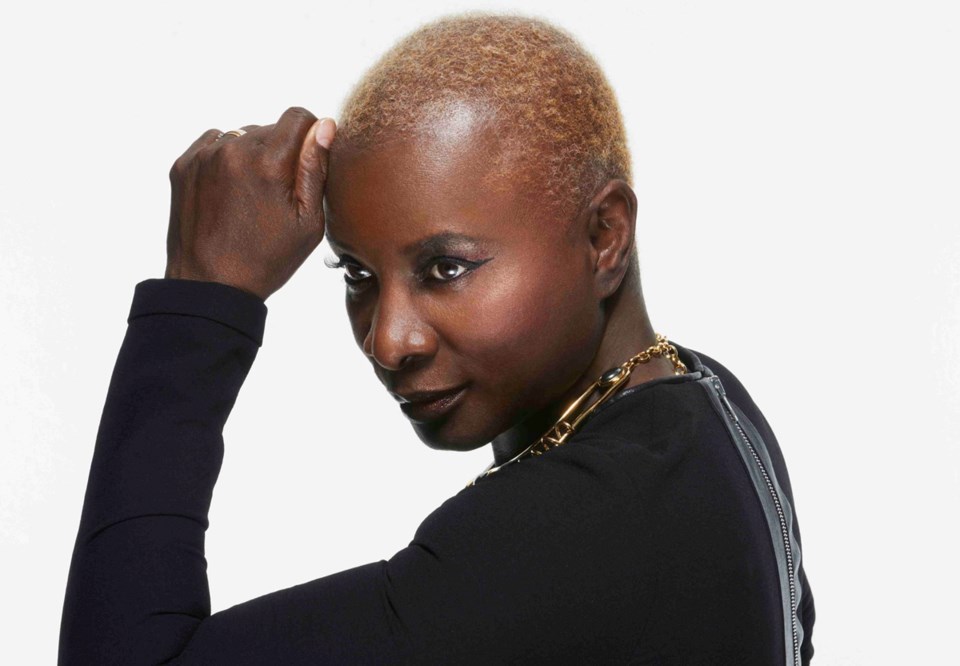What: Angélique Kidjo (opening act Sekoya Revisited)
Where: Royal Theatre
When: Tuesday, 7:30 p.m.
Tickets: $38.50, $48.50; 250-388-4423 or 250-386-6121
Angélique Kidjo, calling from Paris via a dodgy connection, sounded downright cheerful. Originally from the West African country of Benin, the singer capped many of her declarations with a belly laugh.
This is the sort of exuberance Kidjo brings to the stage. The Grammy-winning vocalist is internationally celebrated for her music, a diverse gumbo spanning Afro-funk, gospel, jazz, Zairian rhumba and more. Her quintet is touring her new disc, Eve, which showcases her collaborations with women’s choirs in Kenya and Benin.
Kidjo has also just published her autobiography, Spirit Rising (My Life, My Music), chronicling her early life, her nascent singing career and subsequent escape to Paris from Benin in 1983 after a communist government demanded she sing only their praises.
In her book, Kidjo recalls asking whether she could join her mother’s acting troupe when she was a mere child.
“I knew every part of every single person in the play. So I said to my mom: ‘Why can’t I do that, what she’s doing?’ ” she said.
Soon enough, young Kidjo was put to the test when a youngster in the show fell sick. Kidjo, now terrified (“every bone in my body was shaking around”) donned the girl’s green-and-orange African costume and was shoved on stage. A spotlight hit her face, preventing her from seeing the audience. And then something clicked. Kidjo felt at home.
“Afterwards my mum was looking at me in awe, just stunned. I was like: ‘Mom, how was that, how did I do?’ She said: ‘You did pretty good.’ I think since then I’ve loved it, I loved the feeling,” Kidjo said with a laugh.
It wasn’t all fun and games. When Kidjo hit her teens, some Africans criticized her singing career, declaring her a “whore.” The weeping girl was comforted by her grandmother, who told Kidjo such detractors were stupid and jealous. Such an attitude is still prevalent in parts of Africa, the singer said. Women who aspire to become singers or musicians are considered by some to have loose morals.
“When they start seeing you’re getting some breasts coming on, you’re a woman, you’re not a little girl, you’re perceived as a prostitute,” Kidjo added.
On Eve, Kidjo sings in different Beninese languages: Fon, Yoruba, Goun and Mina. Her belief is that the song dictates the language in which it is sung. Kidjo added: “One thing I learned early is to be in the service of the song .... It doesn’t matter what language you sing them in, people will connect with you.”
She got the idea of using African choirs on Eve while visiting Kenya in 2012. Kidjo was travelling with UNICEF to film a documentary on stunting (the term refers to acute malnutrition, which affects the development of children physically and mentally). The singer met a group of women in the village of Merti, who welcomed her with a chant. Kidjo recorded the song on her iPhone, later using it for the track M’Baamba.
Kidjo also recorded her mother Yvonne (known within her family as “Eve”), whose voice can be heard on the traditional Congolese song Bana. Like the young Kidjo, Yvonne wasn’t shy about singing for her daughter’s album. In fact, her mother was so gung-ho, she would sing when Kidjo was trying to record African women’s choirs as well.
“I’d say: ‘Mom, I don’t want your voice right now. Let the other people sing.’ She looked at me like: ‘You can talk, so I can sing if I want to!’ ”
Another tale from Spirit Rising (My Life, My Music) is about the time an American journalist arranged to have one of Kidjo’s heroes, James Brown, phone her. At first, she couldn’t believe it was the famous soul singer. When Brown mentioned his song Soul Power, Kidjo started singing the signature horn riffs to him.
Over the tinny phone line from France, the irrepressible Kidjo sang these brass parts once again. Then she said: “It was so fun. I loved it.”
Her philosophy in music? To reveal oneself honestly and vulnerably through song.
“For me, the voice is the mirror of your soul,” Kidjo said. “One thing I learned through all the years is if you start lying within that truth, it will destroy you.”



